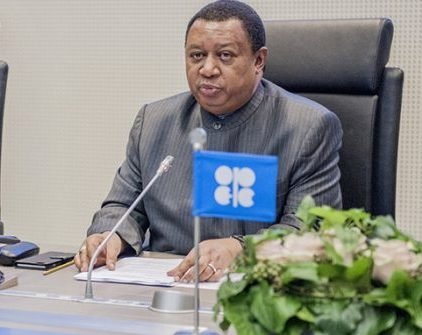Climate action will enhance competitiveness, spark innovation, create jobs
By HE Mohammad Sanusi Barkindo
It is my pleasure to welcome you to OPEC’s 4th Technical Workshop on Climate Change. It is good to see so many familiar faces joining us for this very timely discussion.
We are very pleased to see participants from some non-OPEC countries in the Charter of Cooperation, as well as China and India, along with many other valuable partners and our sister Organization, the OPEC Fund for International Development.
I would like to thank Khalid Abuleif for moderating today’s event. Besides being the senior advisor on Sustainability and Climate Policy for the Kingdom of Saudi Arabia’s Minister of Energy, he is a highly respected veteran negotiator on international climate change agreements. We are most fortunate to have a line-up of distinguished panelists representing diverse perspectives, and I look forward to a robust exchange of ideas.
Distinguished colleagues and guests,
In less than four months, the 26th meeting of the Conference of Parties will begin in the UK. This year’s hosts see COP26 as an opportunity to accelerate the implementation of the Paris Agreement and the UN Framework Convention on Climate Change.
These global climate discussions come at a defining moment in our history. The COVID-19 pandemic and its terrible health and socio-economic impacts have laid bare the vital importance of global cooperation – including in the energy sector.
I shudder to think what would have happened last year had it not been for the unprecedented efforts undertaken by OPEC and our non-OPEC partners in the Declaration of Cooperation to restore oil market stability and support the global recovery. Significantly, the need for concerted action was recognized at the highest policy levels and by key global energy stakeholders, a reflection of the central importance of oil to the worldwide economy and our way of life.
However, today we are seeing increasing pressure coming from decision-makers, investors, and even the boardrooms of oil majors to pursue policies and initiatives that could fundamentally alter the current energy mix – and create energy favorites. The publication of the International Energy Agency’s ‘Net-Zero by 2050’ Report in May – six months before COP26 – exemplifies the shifting narrative, with pronounced implications across the board, including on the oil industry’s ability to invest across the value chain.
Also in May, a court in the Netherlands ordered Royal Dutch Shell to cut its global carbon emissions 45% by the end of 2030 compared to 2019 levels. This dramatic, far-reaching decision sets a precedent that could further shape energy policy directions and investment trends that are exclusionary in nature.
As the energy system transitions to a lower-carbon future, the oil industry needs capital to remain part of the solution – and, of equal importance, to continue to address the world’s growing thirst for energy. Looking ahead 25 years, OPEC’s respected World Oil Outlook sees the global economy doubling in size, the world’s population growing by more than 20%, and energy demand rising by around 25%. Energy stability is and will remain vital to our way of life.
The consensus among all leading forecasters is that oil, together with natural gas, will continue to provide at least half of the world’s energy needs for the foreseeable future. As a result, it is crucial that we continue to have access to capital to innovate, attract highly skilled workers, and support sustainable stability.
At a time when the oil sector is coming under increasing pressure, it is only fair to keep an open mind about the full environmental impact and social footprint of other fuel sources, including the raw materials used in components for renewable energy. These impacts should be weighed against the ongoing advances in productivity across the petroleum value chain, as well as the oil industry’s many decades of experience in driving innovation and efficiency.
Another point I would like to make about the ongoing climate talks relates to something that is very dear to my heart – energy poverty. In my home continent of Africa alone, more than 600 million people have little or no access to electricity and around 900 million lacks safe and clean cooking fuels. The scale of this challenge requires a portfolio of energy options, including abundant and economic resources like oil and gas. The post-COVID-19 recovery will not be complete so long as hundreds of millions of people live in energy poverty.
To support the consultative process on the issues I just mentioned, the OPEC Secretariat is hosting the First Ministerial Roundtable on Energy, Climate and Sustainable Development for oil-producing countries, to take place on September 6th under the umbrella of the OPEC and non-OPEC Charter of Cooperation.
The Roundtable is the first event of its kind held under the two-year-old Charter of Cooperation. It will bring together Ministers and a broad coalition of global energy stakeholders who will play a crucial role in the energy transition.
We aim to establish a regular forum that can develop common positions for oil-producing countries as they pursue the implementation of global environmental goals, and ensure that the perspectives of our countries are included in the global climate discussions.
Distinguished colleagues and guests,
Today’s technical workshop provides an exciting opportunity to discuss in greater detail the climate initiatives of one of our Member Countries, the Kingdom of Saudi Arabia.
Last year, as you may recall, Saudi Arabia held the rotating presidency of the G20. The Kingdom used this influential platform to put the circular carbon economy (CCE) and its ‘4Rs’ – reduce, reuse, recycle and remove – on the global energy agenda. Leaders of the world’s top economies threw their support behind this holistic, integrated, and inclusive approach to managing emissions and expanding energy access. Then in March of this year, Saudi Arabia launched the ‘Saudi Green Initiative’ and the ‘Middle East Green Initiative’ as a further contribution to the global climate efforts.
This trio of pragmatic initiatives forms an integral part of the Kingdom’s efforts to enhance global engagement on energy and environmental policies through the principle of ‘common but differentiated responsibilities and respective capabilities. Moreover, Saudi Arabia wants to work with regional partners, many of the OPEC Member Countries, to transfer knowledge and share experiences.
In mid-June, John Kerry, the US Special Presidential Envoy for Climate, visited both Saudi Arabia and the United Arab Emirates for consultations related to COP26. We understand that hydrogen and other promising technologies were among the topics of discussion. With regard to hydrogen, it is our view that this energy source has enormous potential to provide a multisector solution to the trilemma of secure, affordable, and sustainable energy.
To help set the stage for today’s discussions, we have prepared several questions as a guide for our panel of respected experts. The floor is also open to other issues relevant to today’s workshop.
Before we begin the discussions, I would like to draw your attention to the words of HRH Crown Prince Mohammed Bin Salman when he announced the Kingdom’s key initiatives in March:
“Climate action will enhance competitiveness, spark innovation, and create millions of high-quality jobs. Young people, both in the Kingdom and the world, are demanding a cleaner, greener, and more inclusive future, and we owe it to them to deliver on this. The Kingdom will work with all international partners to further develop these two initiatives and the various programmes and timelines entailed in them.”
I would now like to turn the microphone over to Khalid Abuleif, our moderator. I very much look forward to a robust exchange of ideas.
– Being the remarks delivered by HE Mohammad Sanusi Barkindo, OPEC Secretary-General, at the 4th Technical Workshop on Climate Change, 7 July 2021, via videoconference





